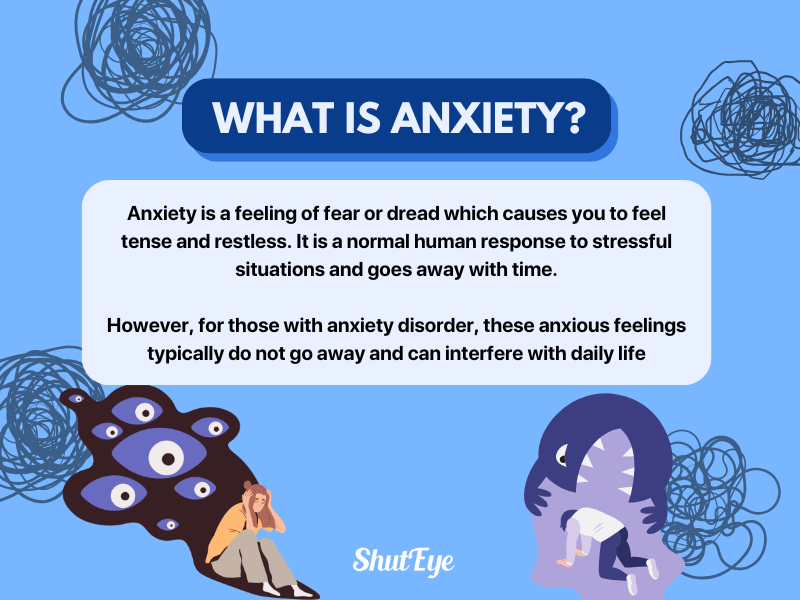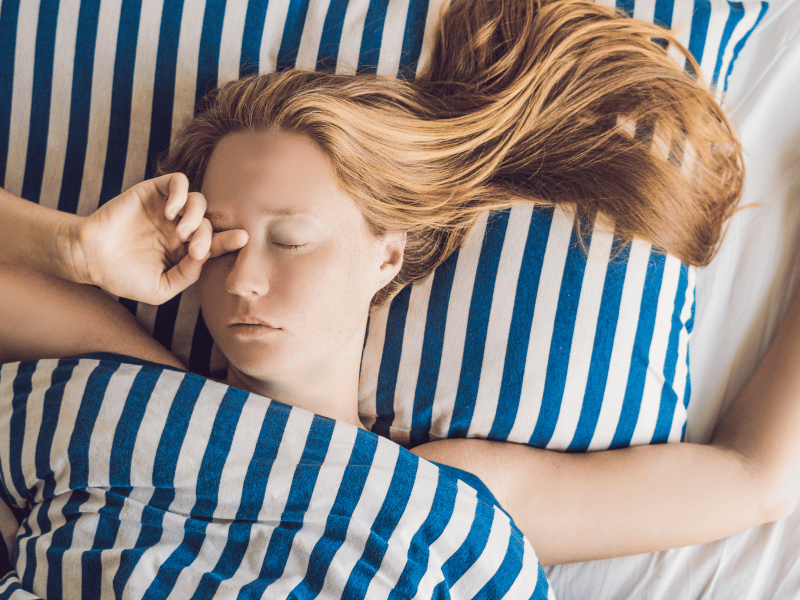


Having feelings of anxiety is a normal part of life, especially when we are caught up in challenging or stressful situations. When it gets too much, it can start to affect our physical and mental health negatively.
It is also why we need to know how to cope with our anxiety so that it doesn’t reach that point. In this article, we’ve compiled a list of 10 ways to manage anxiety effectively.

Anxiety is a feeling of fear or dread which causes you to feel tense and restless. It is a normal human response to stressful situations and goes away with time or when the situation is resolved.
However, for those with anxiety disorder, these anxious feelings typically do not go away and can interfere with daily life [1].
There are different types of anxiety, including generalized anxiety disorder, panic disorder, and social anxiety disorder. They each have their symptoms but the common symptoms are:
For those with generalized anxiety disorder, it is common to struggle with sleep problems like insomnia.
Too much anxiety can cause us to feel overwhelmed, negatively affecting the way we function. There are some effective strategies to help you cope when you are feeling anxious or stressed.
Identifying the cause of your anxiety is the first step towards managing your anxiety properly. Without knowing the root of your anxiety, any anxiety-coping strategy will likely only provide you with temporary relief.
Understanding why you feel a certain way can help you feel empowered and progress [2].

A lack of sleep is one of the common causes of anxiety, even if the individual is healthy. Getting enough deep sleep is particularly important because it produces slow-wave brain activity which affects emotional regulation within the brain. This emotional regulation helps reduce anxiety, making you feel more relaxed [3].
Some ways to improve your sleep habits and get enough sleep include creating a consistent sleep schedule, avoiding using electronic devices before bedtime, and avoiding napping too much during the day.
You can also try to incorporate relaxation techniques such as deep breathing, progressive muscle relaxation, or meditation exercises as part of your daily routine. Spend some time just focusing on calming the mind, reducing your stress levels, and regulating your emotions. Making this a habit whenever you start feeling tense can help you to manage your anxiety effectively.


Caffeine intake is associated with an increased risk of anxiety, especially when it is consumed in doses greater than 400 mg. This is because caffeine is a stimulant that affects the central nervous system. This causes the body to produce adrenaline, making one feel more anxious or nervous [4].
Try limiting your caffeine to 1 to 2 cups a day and increasing your water intake.
Fueling your body with nutritious foods can help to support a greater overall well-being. Try to eat a balanced diet that is filled with fruits, vegetables, whole grains, and lean proteins. Opt for whole foods and avoid consuming excessive amounts of sugar, and processed foods as it can cause an increased feeling of anxiety [5].
Studies suggest that physical activity can help you to ease anxiety. It acts as a form of distraction against your worries and decreases muscle tension, which could contribute to feelings of anxiousness.
Exercising regularly also builds resilience against negative thoughts and emotions. Apart from that, exercise is generally good for improving your overall well-being [6], [7].

Journalling is also a great tool for stress and anxiety management and helps you to manage your emotions healthily. Writing down your feelings and thoughts can help you to process and recognize the triggers or struggles that you face. It allows you to learn how to better control them and encourages positive self-talk [8].
Spending time and connecting with your family and friends can be a good source of emotional support as it provides a safe space to share your feelings. This helps you to reduce stress and feel grounded. It can also be a powerful antidote to anxiety as it fosters a sense of belonging.
Whether it’s a heartfelt conversation or just simply enjoying the company of others, it can boost your mood and foster resilience.
Spending time in nature is thought to be a good way to relieve stress and anxiety and boost feelings of happiness [9]. Taking a walk in the park, a hike in the woods, or simply surrounding yourself with the sounds of nature can help reduce symptoms of anxiety significantly. It is a perfect backdrop for relaxation.
If the anxiety starts to feel overwhelming and prevents you from sleeping, working, or socializing, you may want to consider seeking professional support. Common types of therapy like cognitive behavioral therapy (CBT) help you to challenge your negative thought process and cope better [10].
A word from our sleep advisor
If anxiety is very distressful to you, a therapist can help you identify some of the unhelpful habits (e.g. worrying, rumination, or avoidance) that perpetuate the problem, and help you replace these with better ways of reacting when anxiety arises. – Eric Lim
Anxiety and stress are a normal part of life when we’re dealing with setbacks or major crises. While you may not always have power over these situations, you have control over how you respond to them. Knowing how to manage your anxiety with various strategies can help you to safeguard your mental health and well-being.
Alternatively, you may also consider sleep apps such as ShutEye®. ShutEye offers a wide variety of tools such as guided meditation and sleep sounds to reduce anxiety. Try it for free!
American Heart Association (2024) Spend Time in Nature to Reduce Stress and Anxiety [online]. Available at: https://www.heart.org/en/healthy-living/healthy-lifestyle/stress-management/spend-time-in-nature-to-reduce-stress-and-anxiety
Helgadóttir, B., Forsell, Y., & Ekblom, Ö. (2015). Physical Activity Patterns of People Affected by Depressive and Anxiety Disorders as Measured by Accelerometers: A Cross-Sectional Study. PLoS ONE, 10(1), e0115894. Available at: https://doi.org/10.1371/journal.pone.0115894
Liu, C., Wang, L., Zhang, C., Hu, Z., Tang, J., Xue, J., & Lu, W. (2024). Caffeine intake and anxiety: A meta-analysis. Frontiers in Psychology, 15, 1270246. Available at: https://doi.org/10.3389/fpsyg.2024.1270246
MedlinePlus (2023) Anxiety [online]. Available at: https://medlineplus.gov/anxiety.html
Naidoo, U. (2019) Nutritional strategies to ease anxiety [online]. Available at: https://www.health.harvard.edu/blog/nutritional-strategies-to-ease-anxiety-201604139441
Ratey, J. (2019) Can exercise help treat anxiety? [online]. Available at: https://www.health.harvard.edu/blog/can-exercise-help-treat-anxiety-2019102418096
Safe Space (2023) Seeking Therapy: A Beginner’s Guide [online]. Available at: https://safespace.sg/seeking-therapy-a-beginners-guide/
Tartakovsky, M. (2021) 8 Tips to Get to the Root of Your Anxiety and Why It Matters [online]. Available at: https://psychcentral.com/anxiety/getting-to-the-root-of-your-anxiety
The British Psychological Society (2019) A lack of sleep causes anxiety - but don’t worry about it [online]. Available at: https://www.bps.org.uk/research-digest/lack-sleep-causes-anxiety-dont-worry-about-it
University of Rochester Medical Center (2024) Journaling for Emotional Wellness [online]. Available at: https://www.urmc.rochester.edu/encyclopedia/content?ContentID=4552&ContentTypeID=1